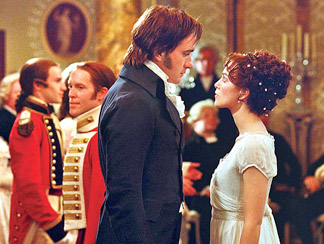Literary matters
K S SIVAKUMARAN
Most students' approach to appreciating literature is wrong. Here are
some foreign universities exam oriented points.
|

A scene from Pride and Prejudice. In literary criticism note how
characters are described and dialogue used |
Most Lankan students in the country offer English Literature as an
optional subject, often as there is no other option. They dislike
literature for lack of understanding of the subject. Some of them think
that they have to memorize some facts and that's it. As we know it is
not a subject that depends entirely on learning facts.
Learning literature is really learning the skills in appreciation of
the subject and demonstrating it with evidence drawn from the book
concerned. In other words students should show how they have understood
and appreciated a work they have read. It is their interpretation that
matters and not entirely how the teacher has expressed his or her views.
For the student to master the subject he or she should read the
specific texts prescribed attentively and write effectively about what
they have read.
As we know literature is composed of beautiful and magical words.
Every single word is relevant and of significance. Therefore the
students should read the texts fully by themselves and try to enjoy the
work to the utmost. The more they read the more pleasure they would
derive.
What the examiners expect from students is their critical
appreciation. The word 'critical', as far as it applies to literature,
means evaluating a work and finding both the strengths and weaknesses.
If a book is very good, then there is hardly any criticism because the
book may have many strengths. Consequently one does not go all the way
to find faults in a book in such an exercise. That is not 'literary
criticism'.
Examiners say that good critical writing is done on three stages:
One: Make a point or argument. Two: Illustrate with an apt quotation,
Three: Show how the quotation explains the point. This serves to modify
the student's original point and add subtle arguments along the way
leading easily to the next paragraph.
Literature is basically about feeling. Sensible opinions and feelings
depend on knowledge acquired by education. Knowledge is gained mostly by
a wide reading. What matters is what the student has got to say about
literature on his own findings and experiences. However any opinion is
not sufficed.
The student has got to base his or her opinion on a sound working
knowledge of the text. The student should be sensitive to the way a book
is written, its suggestions and the way they are expressed. Students can
take into account what other people have sad or written about the
particular work. If needed they should be ready to reread to think
further and be ready to change their mind. Usually there is no final
word in exploring literature. Opinions can be tentative. It is wiser to
use such phrases as 'maybe, might be, perhaps,' and 'in my opinion'.
Literary analysis is also looking into the style, form and structure
of a work. What it all means can be classified as follows for the
convenience of the students: The ordering of events in the telling of
the story is one aspect of the analysis. Is there a strict chronological
order in the narration of events is another. Does it use a 'flashback'
technique or is there a foreshadowing suggested.
Students are aware that most novels are written by an omnipresent
third person narrator, but some are first person narrations. Students
will also note how the characters are described, times of the year,
weather and the like.
How things create feelings and moods in a particular part of the
novel can also be considered. One other aspect that can be looked into
is the dialogue made use of. Do the characters speak in a convincing
manner? Do grammar and vocabulary used contribute to the
characterization can be also possible approaches in understanding
literature.
To what extent things are explained by the writer. Does the writer
leave the readers to come to their own conclusions? Do the events chosen
contribute to the development of the novel? Are they natural or
contrived? These are some ways which can be employed by students in
analyzing questions in the literature paper.
|



